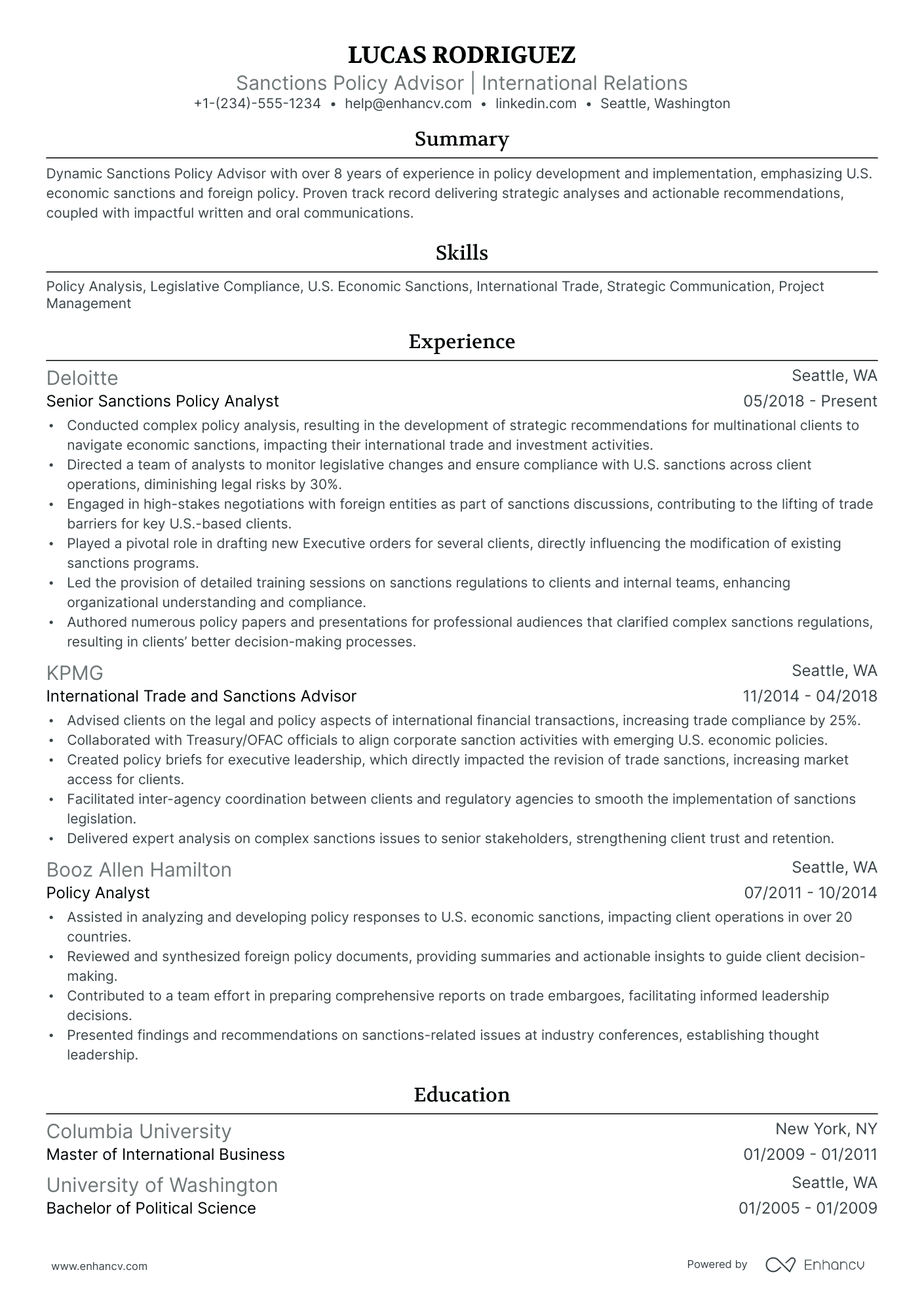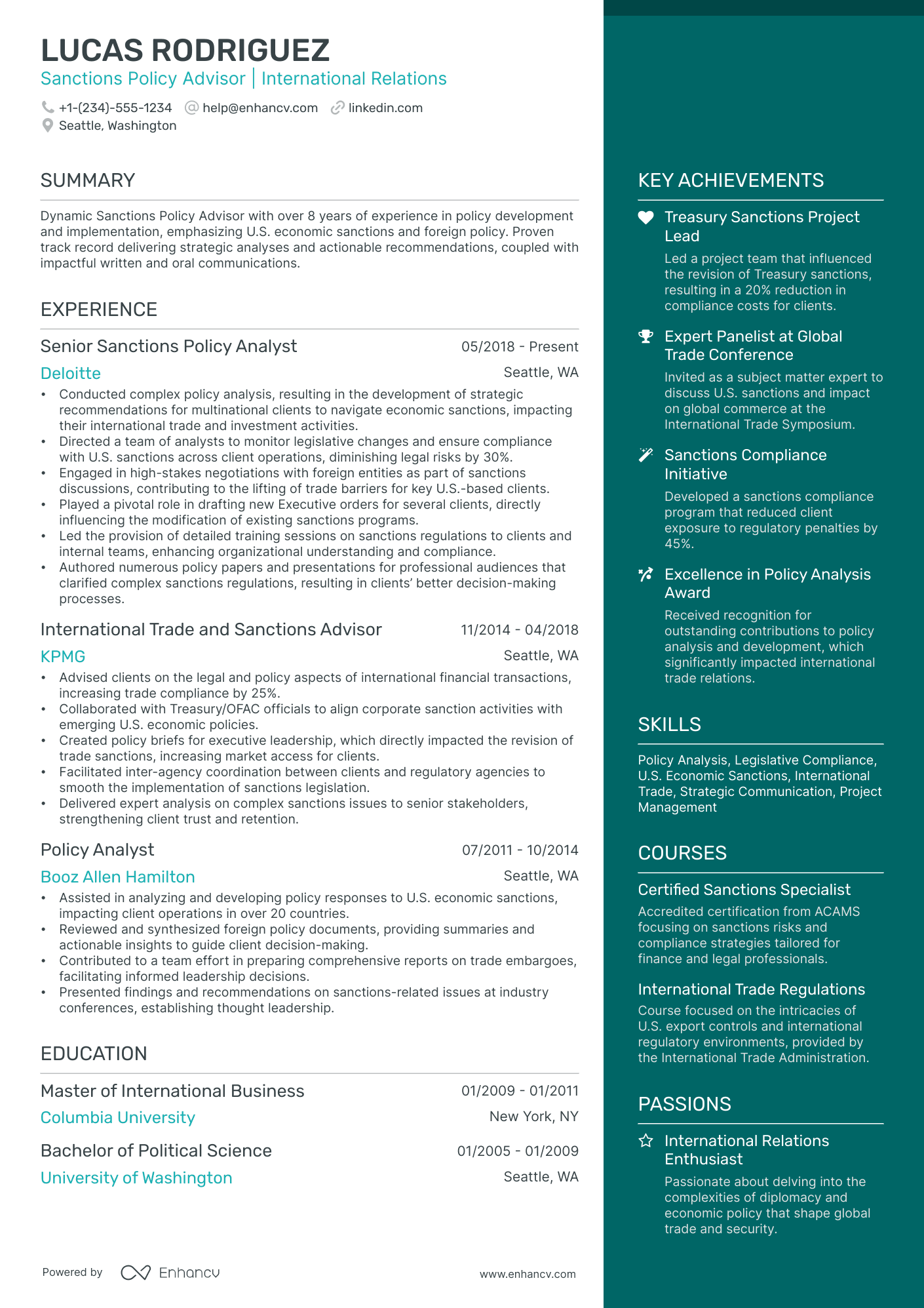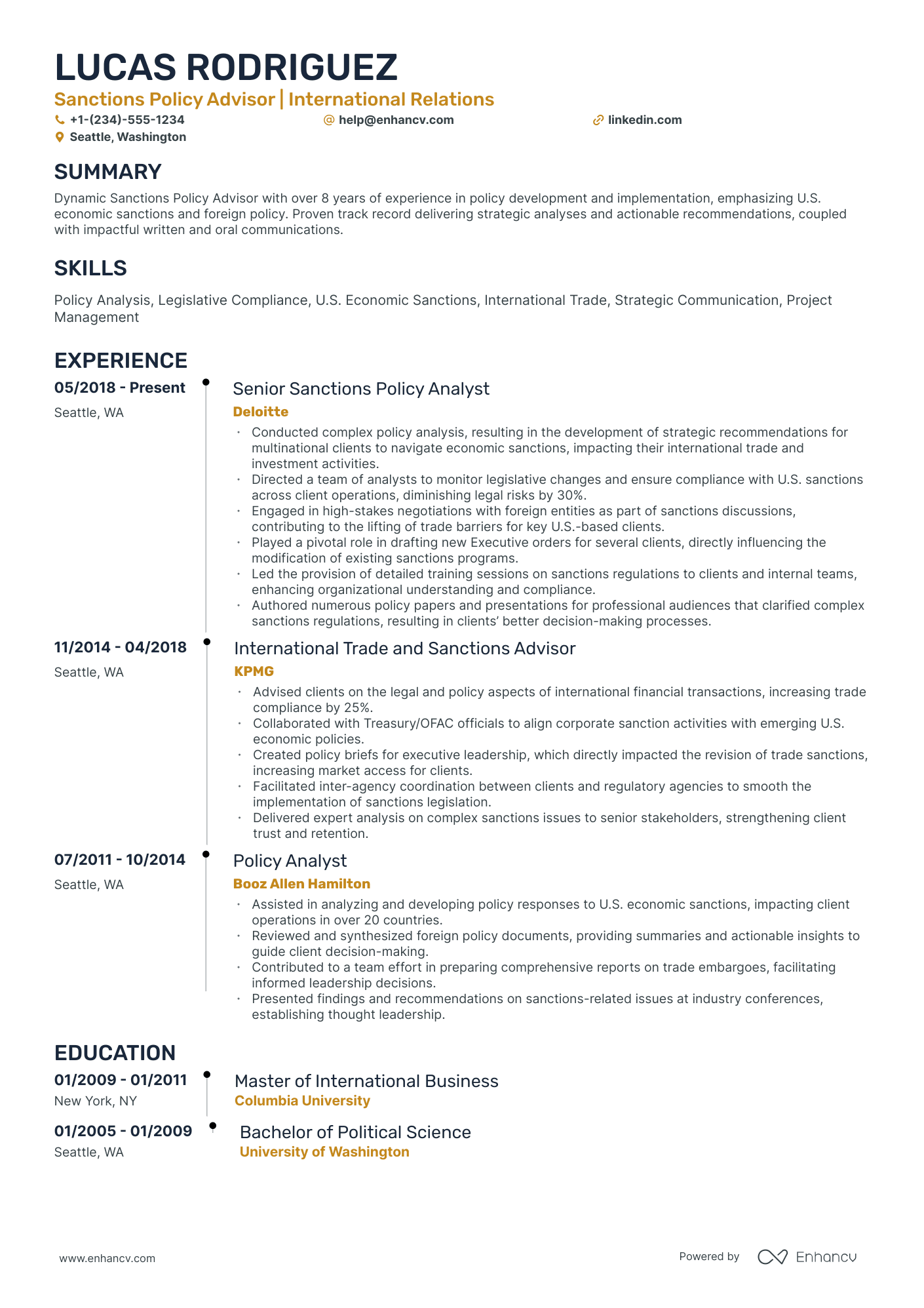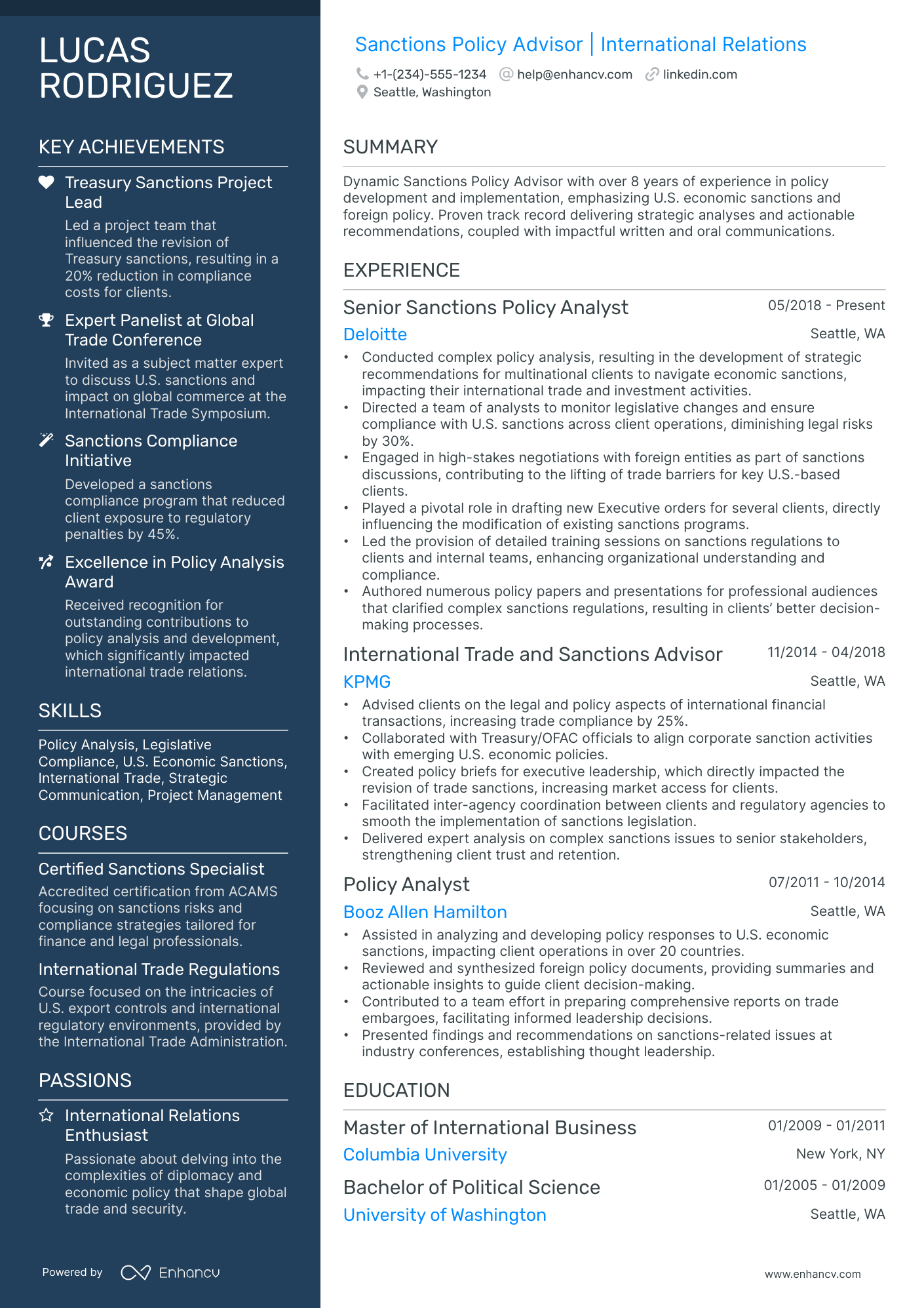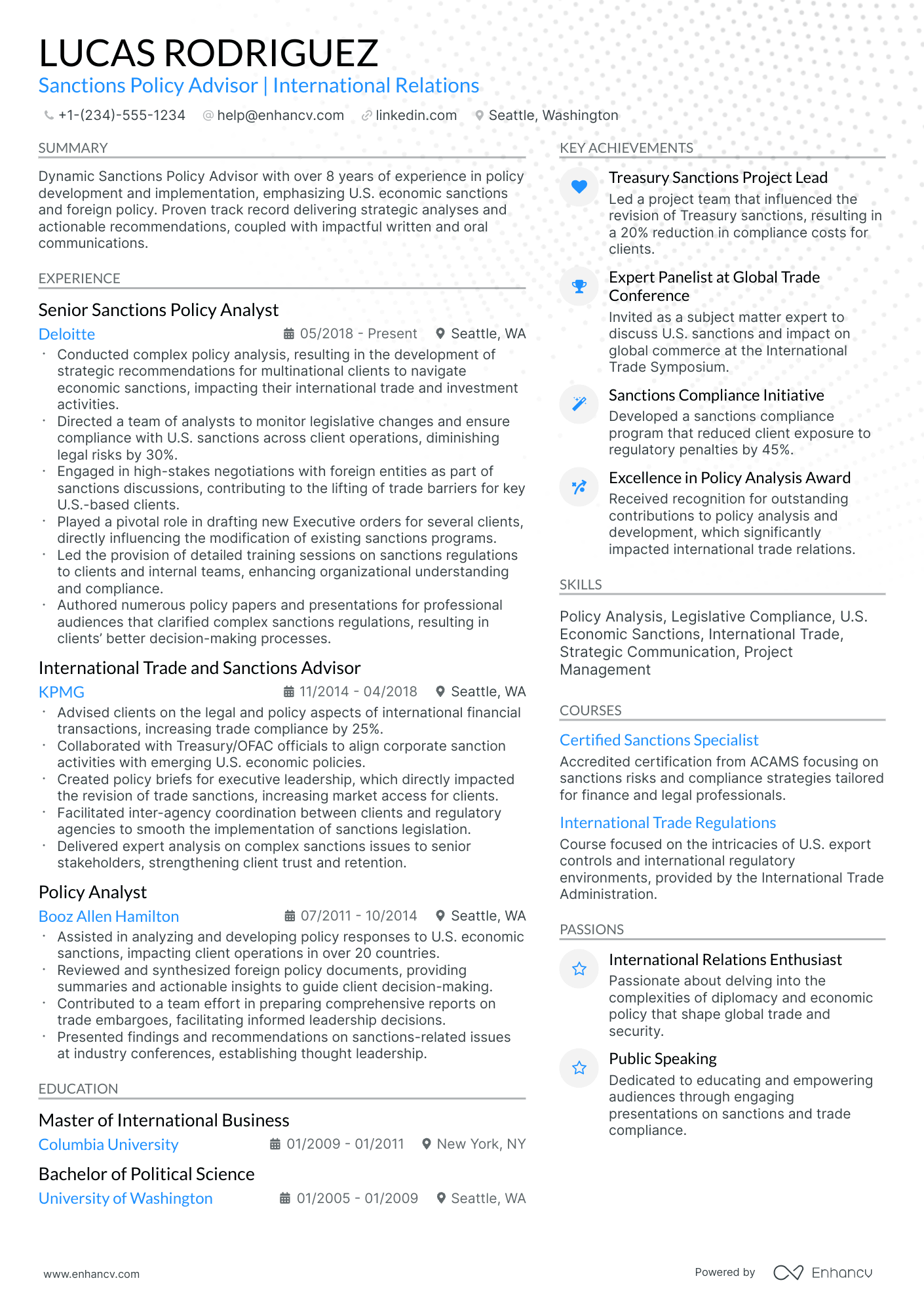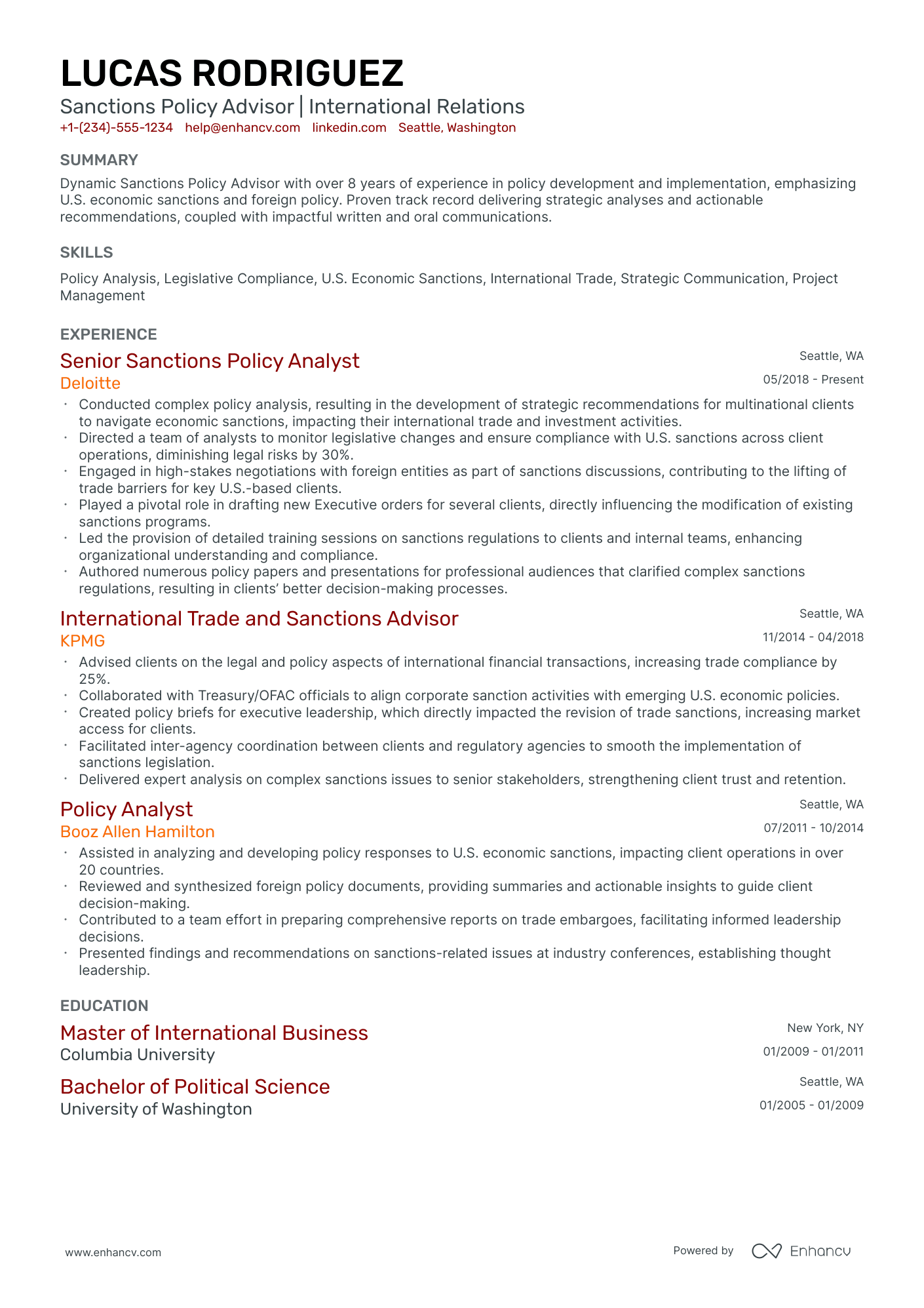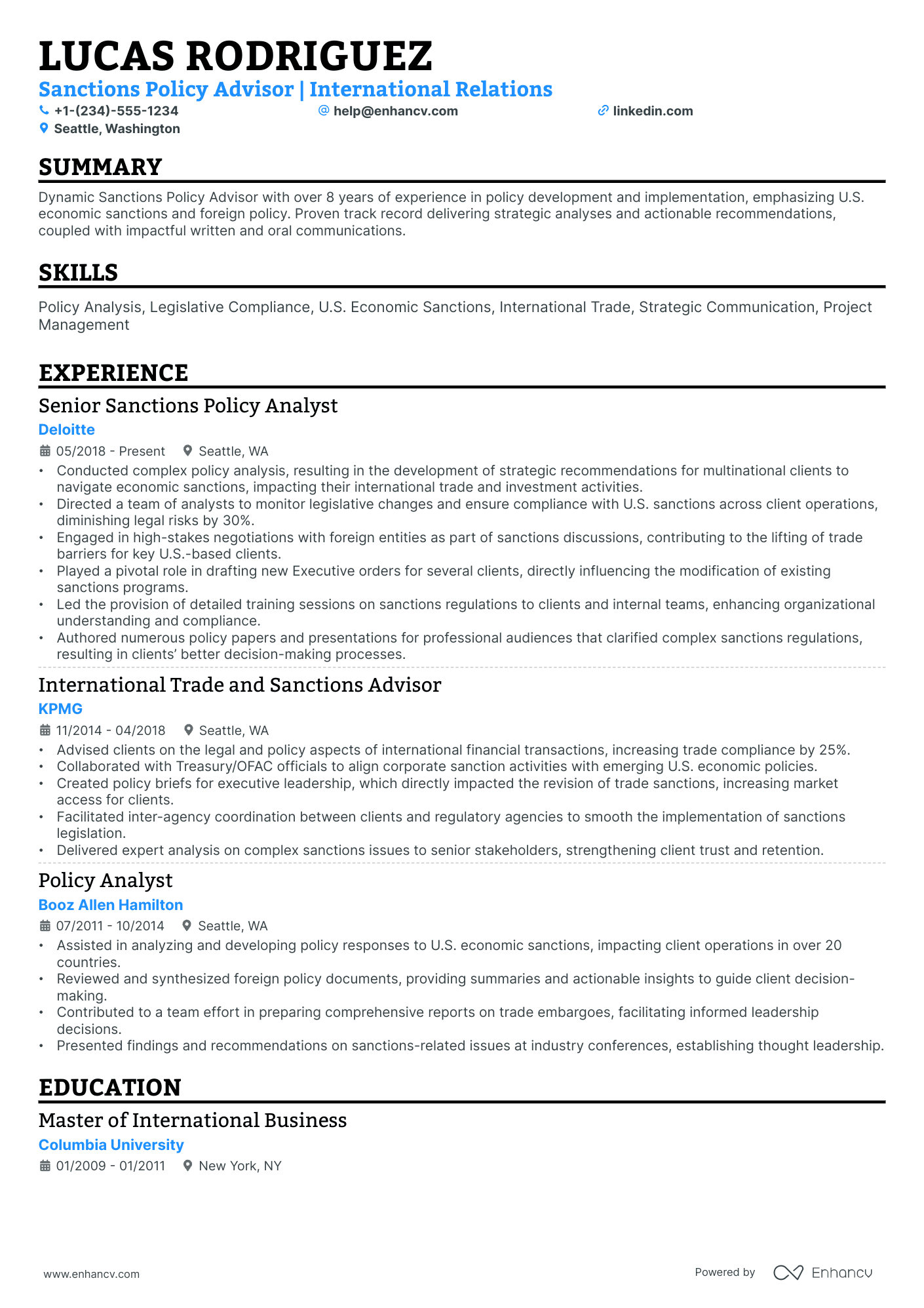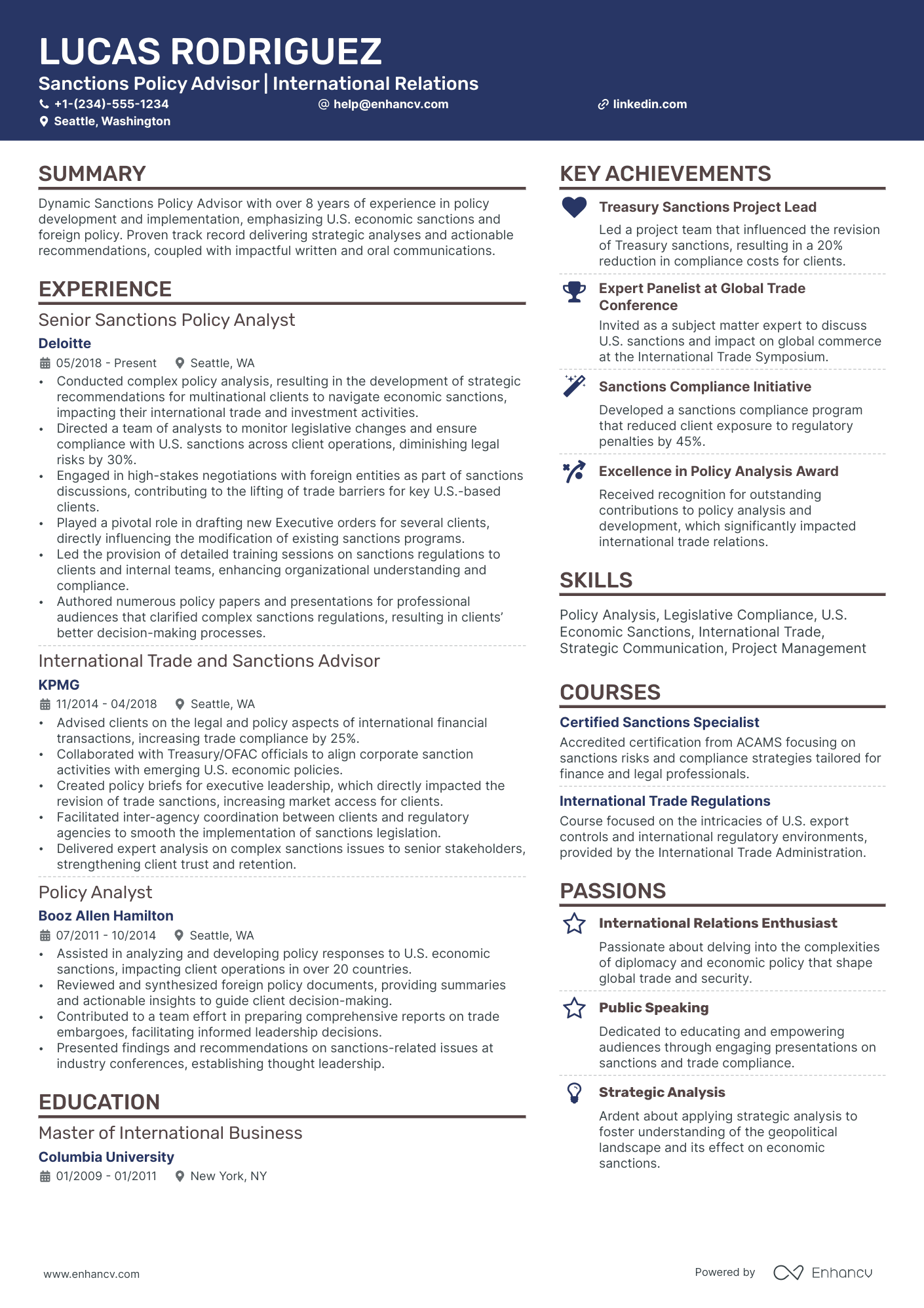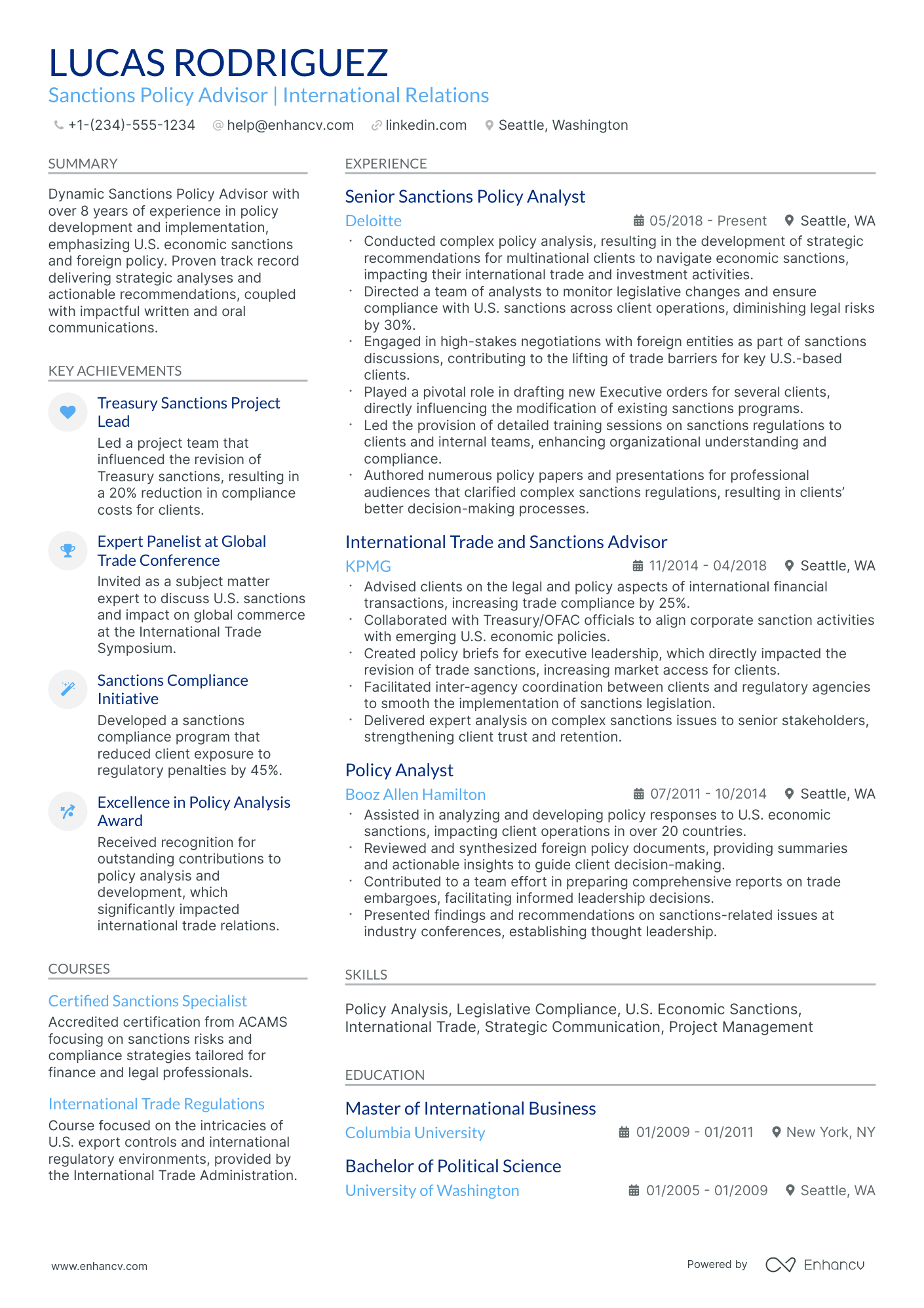Many policy analyst resume submissions fail because they read like job descriptions, burying impact under dense policy language and generic duties. In today's hiring process, applicant tracking system filters and fast recruiter scans reward clear relevance and measurable results. Knowing how to make your resume stand out is critical in a field where analytical rigor must come through on the page.
A strong resume shows what changed because of your work, not just what you used. Highlight outcomes like legislation supported, budget impact quantified, turnaround time reduced, stakeholder alignment achieved, compliance risk lowered, and briefing quality that improved executive decisions.
Key takeaways
- Quantify policy outcomes using metrics like budget impact, compliance rates, and cycle time reductions.
- Use reverse-chronological format for experienced analysts and hybrid format for career switchers.
- Tailor every experience bullet to mirror the job posting's tools, frameworks, and terminology.
- Connect each skill to a measurable result in your experience section, not just a skills list.
- Lead your summary with domain expertise, specific tools, and one standout achievement.
- Leverage academic projects, internships, and policy briefs to build credibility without full-time experience.
- Use Enhancv to turn vague policy duties into focused, recruiter-ready resume bullets faster.
Job market snapshot for policy analysts
We analyzed 123 recent policy analyst job ads across major US job boards. These numbers help you understand employment type trends, role specialization trends, skills in demand at a glance.
What level of experience employers are looking for policy analysts
| Years of Experience | Percentage found in job ads |
|---|---|
| 1–2 years | 8.9% (11) |
| 3–4 years | 3.3% (4) |
| 5–6 years | 5.7% (7) |
| 7–8 years | 6.5% (8) |
| 9–10 years | 2.4% (3) |
| 10+ years | 7.3% (9) |
| Not specified | 68.3% (84) |
Policy analyst ads by area of specialization (industry)
| Industry (Area) | Percentage found in job ads |
|---|---|
| Finance & Banking | 39.0% (48) |
| Government | 32.5% (40) |
| Education | 14.6% (18) |
| Healthcare | 13.0% (16) |
Role overview stats
These tables show the most common responsibilities and employment types for policy analyst roles. Use them to align your resume with what employers expect and to understand how the role is structured across the market.
Day-to-day activities and top responsibilities for a policy analyst
| Responsibility | Percentage found in job ads |
|---|---|
| Data analysis | 15.4% (19) |
| Excel | 15.4% (19) |
| Project management | 9.8% (12) |
| Policy development | 8.9% (11) |
| Policy analysis | 8.1% (10) |
| Microsoft word | 7.3% (9) |
| Research | 7.3% (9) |
| Microsoft office | 6.5% (8) |
| Analytical skills | 5.7% (7) |
| Microsoft excel | 5.7% (7) |
| Sharepoint | 5.7% (7) |
| Data management | 4.9% (6) |
Type of employment (remote vs on-site vs hybrid)
| Employment type | Percentage found in job ads |
|---|---|
| On-site | 58.5% (72) |
| Hybrid | 36.6% (45) |
| Remote | 4.9% (6) |
How to format a policy analyst resume
Recruiters evaluating policy analyst candidates prioritize evidence of analytical rigor, research methodology, and the ability to translate complex data into actionable policy recommendations. A clean, well-structured resume format ensures these signals—along with domain expertise and stakeholder collaboration—surface quickly during both automated screening and manual review.
I have significant experience in this role—which format should I use?
Use a reverse-chronological format to present your deepest and most relevant policy analysis experience first. Do:
- Lead with your most recent role and clearly define the scope of your policy portfolio, including the agencies, legislative bodies, or issue areas you owned.
- Highlight role-specific tools and domains such as statistical modeling software (Stata, R, SPSS), regulatory impact analysis, cost-benefit frameworks, and legislative tracking systems.
- Quantify outcomes tied to policy influence, budget impact, or stakeholder engagement to demonstrate measurable contributions.
I'm junior or switching into this role—what format works best?
A hybrid format works best, allowing you to lead with a targeted skills section while still providing a chronological work history that shows progression. Do:
- Place core competencies—such as qualitative research, data visualization, policy briefing, and legislative analysis—in a dedicated skills section near the top of your resume.
- Include academic research projects, internships, government fellowships, or volunteer policy work as transitional experience that demonstrates applied analytical ability.
- Connect every action to a clear result, even at a small scale, to show recruiters you understand the link between analysis and impact.
Why not use a functional resume?
A functional format strips away the chronological context recruiters need to evaluate where and how you applied your analytical skills, making it harder to verify domain expertise, portfolio scope, or growth across policy areas.
- A functional format may be acceptable if you're transitioning from a related field (such as academic research, journalism, or nonprofit advocacy) with limited formal policy analyst titles, but only if you anchor every listed skill to a specific project, dataset, or policy outcome rather than presenting skills in isolation.
Once your layout and formatting choices are in place, the next step is deciding which sections to include so each one reinforces your qualifications.
What sections should go on a policy analyst resume
Recruiters expect a policy analyst resume to show clear policy impact, strong research rigor, and stakeholder-facing communication. Knowing what to put on a resume helps you prioritize the sections that matter most for this role.
Use this structure for maximum clarity:
- Header
- Summary
- Experience
- Skills
- Projects
- Education
- Certifications
- Optional sections: Publications, Research, Languages
Your experience bullets should emphasize measurable outcomes, policy scope, analytical methods used, and the results your work drove for decision-makers.
Is your resume good enough?
Drop your resume here or choose a file. PDF & DOCX only. Max 2MB file size.
Once you’ve organized your resume with the right categories, focus on writing the experience section to show how you applied those qualifications in real policy work.
How to write your policy analyst resume experience
The experience section is where you prove you've done the work—shaped policy recommendations, delivered research that influenced decisions, and applied analytical frameworks that produced measurable change. Hiring managers prioritize demonstrated impact over descriptive task lists, so every bullet should connect what you did to the outcome it created.
Each entry should include:
- Job title
- Company and location (or remote)
- Dates of employment (month and year)
Three to five concise bullet points showing what you owned, how you executed, and what outcomes you delivered:
- Ownership scope: the policy areas, legislative portfolios, regulatory domains, research agendas, or stakeholder relationships you were directly accountable for as a policy analyst.
- Execution approach: the research methodologies, data analysis tools, policy frameworks, modeling techniques, or evaluation methods you used to inform recommendations and drive decisions.
- Value improved: changes to policy effectiveness, regulatory compliance, program efficiency, public accessibility, equity outcomes, or organizational risk that resulted from your analytical work.
- Collaboration context: how you worked across government agencies, advocacy organizations, legislative offices, internal departments, or community stakeholders to build consensus and advance policy objectives.
- Impact delivered: outcomes expressed through adoption of your recommendations, shifts in policy direction, improvements to program performance, or scale of populations and budgets your work affected.
Experience bullet formula
A policy analyst experience example
✅ Right example - modern, quantified, specific.
Senior policy analyst
City of Denver Department of Public Health & Environment | Denver, CO
2021–Present
Supported a large municipal public health agency delivering programs across housing, behavioral health, and environmental health.
- Led a cross-agency policy evaluation using R, SQL, and Tableau to measure outcomes across eight programs, improving on-time reporting from 62% to 94% and reducing manual data prep by 18 hours per month.
- Built a cost-benefit model in Excel and R for a lead hazard control ordinance, informing City Council approval and projecting $3.2M in avoided healthcare and remediation costs over five years.
- Drafted and negotiated implementation guidance with legal, program managers, and community partners, cutting permit processing time by 22% while maintaining 98% compliance in post-launch audits.
- Designed a survey and focus group protocol in Qualtrics and NVivo, increasing resident response rates by 35% and driving three policy revisions tied to equity impact findings.
- Developed a monitoring dashboard and KPI framework aligned to federal grant requirements, reducing audit findings from six to one and securing $1.8M in continued funding.
Now that you've seen how a strong experience section comes together, let's look at how to adjust yours to match the specific role you're targeting.
How to tailor your policy analyst resume experience
Recruiters evaluate policy analyst resumes through both human review and applicant tracking systems (ATS). Tailoring your resume to the job description increases your chances of passing both screening layers.
Ways to tailor your policy analyst experience:
- Match specific policy analysis tools or databases named in the posting.
- Mirror the exact terminology used for legislative or regulatory frameworks.
- Reflect stakeholder engagement models or collaboration structures referenced.
- Incorporate relevant policy domains such as health education or housing.
- Highlight compliance or regulatory monitoring duties when the role requires them.
- Use the same language for research methodologies or evaluation standards listed.
- Emphasize quantitative or qualitative impact metrics the employer prioritizes.
- Include experience with briefing formats or reporting workflows they mention.
Tailoring means aligning your real accomplishments with the employer's stated requirements, not forcing keywords where they don't belong.
Resume tailoring examples for policy analyst
| Job description excerpt | Untailored | Tailored |
|---|---|---|
| "Conduct cost-benefit analyses of proposed regulatory changes using Stata and R to inform legislative recommendations." | Performed research and analysis to support organizational decision-making. | Conducted cost-benefit analyses of 12 proposed regulatory changes using Stata and R, producing legislative briefs that informed three enacted policy amendments. |
| "Collaborate with federal and state stakeholders to evaluate Medicaid waiver programs and prepare policy memos for senior leadership." | Worked with team members on various healthcare projects and wrote reports. | Partnered with federal and state stakeholders to evaluate two Medicaid Section 1115 waiver programs, drafting policy memos that guided senior leadership on $40M in funding reallocation. |
| "Monitor emerging climate legislation and synthesize peer-reviewed research to develop evidence-based policy recommendations for EPA compliance." | Kept up with industry trends and prepared documents for internal use. | Tracked 15+ pieces of emerging climate legislation across three congressional sessions, synthesizing peer-reviewed research into evidence-based recommendations that shaped the agency's EPA compliance strategy. |
Once you’ve aligned your experience with the role’s priorities, quantify your policy analyst achievements to show the results of that work with clear, measurable impact.
How to quantify your policy analyst achievements
Quantifying your achievements proves your policies changed outcomes, not just documents. Focus on cycle time, compliance, risk reduction, budget impact, and stakeholder adoption across programs, agencies, and regulated processes.
Quantifying examples for policy analyst
| Metric | Example |
|---|---|
| Cycle time | "Cut policy review time from 12 to seven weeks by standardizing templates in Microsoft Word and tracking approvals in SharePoint." |
| Compliance rate | "Raised audit compliance from 86% to 96% by rewriting procedures and delivering eight trainings to 120 staff across three divisions." |
| Risk reduction | "Reduced high-risk findings by 30% by updating control language and implementing a quarterly risk register in Excel for 25 programs." |
| Budget impact | "Identified $1.2M in annual savings by analyzing vendor spend and recommending contract consolidation across five service lines." |
| Stakeholder adoption | "Achieved 90% adoption of new intake policy within 60 days by piloting with two offices and incorporating feedback from 18 stakeholders." |
Turn vague job duties into measurable, recruiter-ready resume bullets in seconds with Enhancv's Bullet Point Generator.
Once you've crafted strong bullet points that showcase your achievements, the next step is ensuring your resume highlights the right mix of hard and soft skills employers expect from a policy analyst.
How to list your hard and soft skills on a policy analyst resume
Your skills section shows you can translate research into actionable recommendations, and recruiters and ATS (applicant tracking system) scan this section to confirm role fit fast; aim for a balanced mix of policy-domain hard skills and execution-focused soft skills. policy analyst roles require a blend of:
- Product strategy and discovery skills.
- Data, analytics, and experimentation skills.
- Delivery, execution, and go-to-market discipline.
- Soft skills.
Your skills section should be:
- Scannable (bullet-style grouping).
- Relevant to the job post.
- Backed by proof in experience bullets.
- Updated with current tools.
Place your skills section:
- Above experience if you're junior or switching careers.
- Below experience if you're mid/senior with strong achievements.
Hard skills
- Policy research and analysis
- Legislative and regulatory tracking
- Policy memo and briefing writing
- Program evaluation, logic models
- Cost-benefit analysis, fiscal notes
- Stakeholder mapping and analysis
- Survey design, questionnaire development
- Qualitative analysis, interview coding
- Microsoft Excel, pivot tables
- SQL querying
- R, Python
- Tableau, Power BI
Soft skills
- Translate analysis into recommendations
- Write for nontechnical audiences
- Brief leaders under time pressure
- Facilitate cross-functional alignment
- Ask clarifying policy questions
- Challenge assumptions with evidence
- Prioritize work across deadlines
- Manage stakeholder expectations
- Document decisions and rationale
- Navigate sensitive political contexts
- Negotiate feasible policy tradeoffs
- Own deliverables end-to-end
How to show your policy analyst skills in context
Skills shouldn't live only in a bulleted list on your resume. Explore resume skills examples to see how other policy professionals present their competencies effectively.
They should be demonstrated in:
- Your summary (high-level professional identity)
- Your experience (proof through outcomes)
Here's what strong, skills-rich entries look like in practice.
Summary example
Senior policy analyst with 10 years in healthcare policy, skilled in regulatory impact analysis, Stata, and stakeholder engagement. Led a Medicaid cost-review initiative that reduced program spending by 14% across three state agencies.
- Reflects senior-level expertise clearly
- Names role-relevant tools and methods
- Quantifies impact with a strong metric
- Signals collaboration as a soft skill
Experience example
Senior Policy Analyst
Meridian Public Affairs | Washington, DC
March 2019–Present
- Developed fiscal impact models in Stata and R, informing budget proposals that saved the agency $2.3M annually.
- Collaborated with six cross-agency working groups to draft regulatory frameworks adopted across four federal programs.
- Led qualitative program evaluations using stakeholder interviews, producing briefs that shortened legislative review cycles by 21%.
- Every bullet includes measurable proof
- Skills surface naturally through real outcomes
Once you’ve tied your policy analysis strengths to measurable outcomes and relevant examples, the next step is learning how to build a policy analyst resume with no experience using those same proof points.
How do I write a policy analyst resume with no experience
Even without full-time experience, you can demonstrate readiness through academic work and applied projects. Our guide on writing a resume without work experience covers strategies that apply directly to entry-level policy analyst candidates.
- Capstone policy memo with recommendations
- University research assistant policy work
- Legislative internship constituent case tracking
- Nonprofit program evaluation data analysis
- Public data dashboard using Census data
- Policy brief for student organization
- Grant proposal research and budgeting
- Freedom of Information Act requests
Focus on:
- Policy memos with cited sources
- Quantitative analysis and clear visuals
- Stakeholder, agency, and law context
- Results, metrics, and deliverables
Resume format tip for entry-level policy analyst
Use a hybrid resume format so you can lead with projects, research, and technical skills, while still showing a clear timeline for internships and roles. Do:
- Put a Projects section near top.
- Quantify outputs, timelines, and impact.
- List tools: Excel, R, SQL, Tableau.
- Cite datasets, statutes, and agencies.
- Tailor keywords to each posting.
- Built a Census-based Tableau dashboard tracking housing cost burden across five counties, cutting data pull time 40% and informing three policy memo recommendations.
Even without traditional work experience, your academic background can serve as the foundation of your resume—so presenting your education strategically is essential.
How to list your education on a policy analyst resume
Your education section helps hiring teams confirm you have the analytical foundation a policy analyst needs. It validates your training in research, economics, or public affairs.
Include:
- Degree name
- Institution
- Location
- Graduation year
- Relevant coursework (for juniors or entry-level candidates)
- Honors & GPA (if 3.5 or higher)
Skip month and day details—list the graduation year only.
Here's a strong education entry for a policy analyst resume.
Example education entry
Master of Public Policy
Georgetown University, Washington, D.C.
2022 | GPA: 3.8/4.0
- Relevant coursework: Econometrics, Regulatory Analysis, Public Finance, Program Evaluation, and Statistical Methods for Policy Research
- Honors: Dean's List, Pi Alpha Alpha National Honor Society
How to list your certifications on a policy analyst resume
Certifications on a resume show a policy analyst's commitment to learning, proficiency with research tools, and relevance to current policy methods, regulations, and evaluation practices.
Include:
- Certificate name
- Issuing organization
- Year
- Optional: credential ID or URL
- Put certifications below education when they're older, broad, or secondary to your degree and core policy analyst qualifications.
- Put certifications above education when they're recent, highly relevant to the role, or required for the policy analyst position.
Best certifications for your policy analyst resume
Project Management Professional (PMP) Certified Public Manager (CPM) Certified Government Financial Manager (CGFM) Certified Regulatory Compliance Manager (CRCM) Lean Six Sigma Green Belt Certified Fraud Examiner (CFE) Tableau Desktop Specialist
Once you’ve placed your credentials where hiring managers can quickly verify them, you’re ready to write your policy analyst resume summary to highlight the value those qualifications bring.
How to write your policy analyst resume summary
Your resume summary is the first thing a recruiter reads, so it sets the tone for everything that follows. A strong summary instantly connects your policy expertise to the specific needs of the role.
Keep it to three to four lines, with:
- Your title and total years of experience in policy analysis or related fields.
- The domain you specialize in, such as public health, education, housing, or fiscal policy.
- Core skills and tools like statistical modeling, Stata, R, SPSS, or legislative research.
- One or two measurable achievements, such as cost savings or policy adoption rates.
- Soft skills tied to real outcomes, like stakeholder communication that advanced a proposal.
PRO TIP
At the entry or mid-level, emphasize your analytical skills, relevant tools, and any early contributions to published reports or adopted recommendations. Avoid vague phrases like "passionate about making a difference" or "results-driven professional." Instead, ground every claim in something specific you did and the outcome it produced.
Example summary for a policy analyst
Policy analyst with three years of experience in state-level education policy. Skilled in Stata, qualitative coding, and fiscal impact analysis. Co-authored two briefs that informed $4.2M in grant reallocation decisions.
Optimize your resume summary and objective for ATS
Drop your resume here or choose a file.
PDF & DOCX only. Max 2MB file size.
Now that your summary is crafted to highlight your strongest qualifications, make sure the header above it presents your contact details correctly so recruiters can actually reach you.
What to include in a policy analyst resume header
A resume header is the top section with your key identifiers, and it drives visibility, credibility, and fast recruiter screening for a policy analyst.
Essential resume header elements
- Full name
- Tailored job title and headline
- Location
- Phone number
- Professional email
- GitHub link
- Portfolio link
A LinkedIn link helps recruiters verify experience quickly and supports screening.
Do not include photos on a policy analyst resume unless the role is explicitly front-facing or appearance-dependent.
Match your header title and headline to the target policy analyst job posting, and keep formatting consistent across your resume and links.
Example
Policy analyst resume header
Jordan Lee
Policy Analyst | Public Policy Research, Program Evaluation, and Stakeholder Briefings
Washington, DC
(202) 555-01XX
jordan.lee@enhancv.com
github.com/jordanlee
yourwebsite.com
linkedin.com/in/jordanlee
Once your contact details and role identifiers are clear at the top, you can strengthen the rest of your application by adding relevant additional sections for policy analyst resumes.
Additional sections for policy analyst resumes
When your core sections don't fully capture your expertise, additional sections can strengthen your credibility and set you apart from competing candidates.
Consider adding these sections tailored to the policy analyst role:
- Languages
- Publications and policy briefs
- Professional affiliations and memberships
- Conferences and panels
- Volunteer policy work
- Awards and grants
- Continuing education and fellowships
Once you've rounded out your resume with the right supplementary sections, it's worth turning your attention to the document that often accompanies it—your cover letter.
Do policy analyst resumes need a cover letter
A cover letter isn't required for every policy analyst role, but it often helps. If you're unsure what a cover letter is or when to use one, it can make a difference in competitive postings or when hiring teams expect writing samples. Skip it when the application says not to include one.
Use a cover letter when it adds context your resume can't:
- Explain role and team fit by linking your policy analyst strengths to the job's policy area, stakeholders, and decision process.
- Highlight one or two relevant projects and outcomes, using specific metrics or deliverables that match the role's priorities.
- Show you understand the product, users, or business context by referencing how policy changes affect operations, risk, or customer experience.
- Address career transitions or non-obvious experience by connecting past work to policy analyst skills like research, analysis, and clear recommendations.
Drop your resume here or choose a file.
PDF & DOCX only. Max 2MB file size.
Whether you include a cover letter or rely on your resume to carry the application, using AI to improve your policy analyst resume helps you strengthen the document employers will evaluate first.
Using AI to improve your policy analyst resume
AI can sharpen your resume's clarity, structure, and impact. It helps refine language and highlight measurable results. But overuse strips authenticity. Once your content feels clear and role-aligned, step away from AI entirely. If you're exploring tools, our guide on which AI is best for writing resumes can help you choose the right one.
Here are 10 practical prompts to strengthen specific sections of your policy analyst resume:
- Strengthen your summary. "Rewrite my policy analyst resume summary to emphasize legislative expertise and data-driven recommendations in under four sentences."
- Quantify experience bullets. "Add measurable outcomes to these policy analyst experience bullets using percentages, dollar amounts, or population figures served."
- Sharpen action verbs. "Replace weak verbs in my policy analyst experience section with strong, specific action verbs tied to research and advocacy."
- Align skills strategically. "Reorganize my policy analyst skills section to prioritize competencies matching this specific job description I'm pasting below."
- Clarify project descriptions. "Simplify these policy analyst project descriptions so each one clearly states the problem, method, and outcome in one sentence."
- Tighten education details. "Edit my policy analyst education section to highlight relevant coursework, capstone research, and honors tied to public policy."
- Improve certification relevance. "Rewrite my certifications section to explain how each credential directly supports my qualifications as a policy analyst."
- Remove redundant phrasing. "Identify and eliminate repeated or filler language across all sections of my policy analyst resume."
- Tailor for federal roles. "Adjust my policy analyst experience bullets to reflect language commonly used in federal government job postings."
- Enhance readability overall. "Break up any dense sentences in my policy analyst resume so every bullet reads clearly in under 20 words."
Stop using AI once your resume sounds accurate, specific, and aligned with real experience. AI should never invent experience or inflate claims—if it didn't happen, it doesn't belong here.
Conclusion
A strong policy analyst resume proves impact with measurable outcomes, shows role-specific skills, and follows a clear structure. Use focused bullets, consistent formatting, and precise language to make your work easy to scan.
This approach signals readiness for today’s hiring market and the near-future market. When your resume ties results to the policy analyst role, employers can quickly see fit and value.
